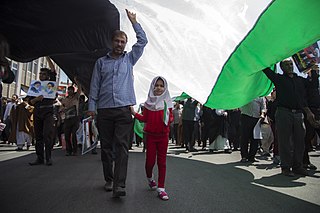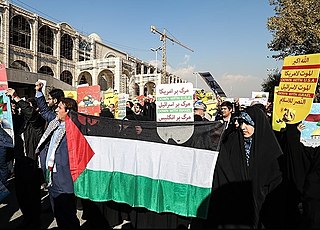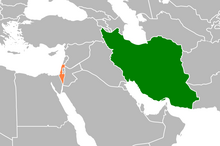
Radio Zamaneh is an Amsterdam-based Persian language exile news platform and former radio broadcaster with a leftist approach. "Zamaneh" is the Persian literary term for "time".
Lieutenant General Sayed Abdul Ghafar Sayed zadah, is an Afghan Lieutenant general. He served for more than 30 years in policing in Afghanistan; currently he is serving as General Chief of Herat police headquarters.
The Government's Obligation to Protect the Nuclear Rights and Achievements of Iranian Nation Act is a bill that was passed on 23 June 2015 by Iran's Islamic Consultative Assembly to support Iran's nuclear program and put some constraints on Iranian President Hassan Rouhani in the negotiations leading to the Joint Comprehensive Plan of Action.

Public Security Police of FARAJA or simply Security Police, is a domestic security agency and law enforcement agency in Iran. The agency a subdivision of Law Enforcement Force of Islamic Republic of Iran and part of Council for Intelligence Coordination. it was split to separate independent entities in December 2021, part of Iranian Intelligence Community.
The Islamic Republic of Iran Government's Reciprocal and Proportional Action in Implementing the JCPOA Act is a bill that was passed by Iran's Islamic Consultative Assembly to allow the Government of Hassan Rouhani implement the Joint Comprehensive Plan of Action (JCPOA). The act repealed Iran Nuclear Achievements Protection Act. The bill was introduced after 5 of the 15 members of Majlis special commission for examining the JCPOA issued a joint statement criticizing the commission report and lawmakers voted against fast-tracking the bill to the extent recommended by the report.
Law of "confrontation with human-rights violations, and USA adventuresome and terrorist measures in the region" is a comprehension plan; including 9 sections, in 27 articles. It has been ratified in the National-Security and Foreign-Policy Commission of the Islamic Consultative Assembly of Iran.

The several branches of the Armed Forces of the Islamic Republic of Iran are represented by flags. Within the Iranian military, various flags fly on various occasions, and on various ships, bases, camps, and military academies.

The Iranian identity booklet, also known as the Shenasnameh, is one of the identity documents issued in Iran. This identity document is in booklet format and issued to Iranian citizens at birth. The National Organization for Civil Registration of Iran is obliged to issue an identity booklet to every Iranian citizen.

Identity documents in Iran are official documents of Iranians identity and citizenship and are used to identification and authentication. The most important identity documents in Iran are the Iranian identity booklet and the Iranian identity card. Identity documents for foreign nationals are resident card and employment card.

The policy of exporting the Islamic Revolution is a strategy in Iran's foreign policy that believes in exporting the teachings of the Iranian Revolution of 1979 to achieve similar examples in Islamic and even non-Islamic countries. This policy has been explicitly and at various times announced by Ruhollah Khomeini, the founder of the Islamic Republic of Iran. One of the basic slogans of the Islamic Revolution of Iran is the export of the revolution. Accordingly, the purpose is exporting the revolution as a culture, ideology and an intellectual and epistemological method.

The Specialized Commissions of the Parliament of Iran are groups of representatives that are formed with the aim of expertly reviewing the plans and bills proposed in the Islamic Consultative Assembly of Iran.

Pursuant to Article 44 of the Law on Internal Regulations of the Islamic Consultative Assembly, the Article 90 of the Constitution Commission of the Islamic Consultative Assembly is formed in order to organize and streamline the Assembly and the representatives, especially in relation to the work of the Executive, Judiciary and Parliament branches, based on various articles of the constitution, especially its ninetieth article. The structure of the members of this commission is as follows:
- One representative from each specialized commission of the Assembly
- Eight representatives elected by the heads of branches and the board of directors of the Assembly as permanent members

Pursuant to Article 46 of the Law on Internal Regulations of the Islamic Consultative Assembly, the Education, Research and Technology Commission of the Islamic Consultative Assembly shall be formed in accordance with the provisions of the regulations to perform its assigned duties in the areas of general education, technical and vocational education, higher education and research and technology matters in the Islamic Republic of Iran.

Pursuant to Article 52 of the Law on Internal Regulations of the Islamic Consultative Assembly, the Health and Medical Commission of the Islamic Consultative Assembly is formed to perform the assigned duties in the field of health, treatment, relief, welfare, social security, social insurance and the Red Crescent affairs in the country in accordance with the provisions of the regulation.

Pursuant to Article 58 of the Law on Internal Regulations of the Islamic Consultative Assembly, the Agriculture, Water, Natural Resources and Environment Commission of the Islamic Consultative Assembly is formed to perform its assigned duties in the fields of agriculture, water resources, livestock and poultry, fisheries, the environment and meteorology in accordance with the provisions of the regulation.

The Protection of the Islamic Revolution of the Palestinian People Act is a plan that was passed on May 9, 1990 by the Islamic Consultative Assembly. The Act refers to the illegal occupation of Palestinian territories by the Zionist regime and the need to support the Palestinian people in restoring their legal rights.

The Act to Obliging the Government to Provide Comprehensive Support to the Oppressed Palestinian People is a plan that was passed on December 31, 2008 by the Islamic Consultative Assembly in accordance to the Article 123 of the Constitution of the Islamic Republic of Iran. The Act refers to the humanitarian aid of the Iranian nation to the oppressed nation of Palestine and condemnation of the crimes of the Zionist regime against them.
The Islamic Revolutionary Guards Corps Cyber Security Command is a command of the Iranian Islamic Revolutionary Guard Corps responsible for cyber warfare and cyber security. It was founded in 2006(1386), its command was established in 2015(1393).

The Zionist regime is a political term that some opponents use instead of the Israeli government. In the political literature of the Islamic Republic of Iran, this title and similar titles such as the occupation regime of Quds are used to name Israeli government. Hamas and Lebanon's Hezbollah groups also use this term in their literature to refer to the Israeli government. They also use the term Zionists and occupiers for non-Palestinian citizens of Israel, especially its government and military forces.
Israel won't exist in 25 years is a statement of Ali Khamenei in a speech about Israel after the Iran nuclear deal framework, which was published on his Twitter. According to Khamenei's official website, this sentence was chosen as "the most important and memorable sentence of Khamenei" in 2015. This slogan is used in propaganda and also in the Quds Day.












